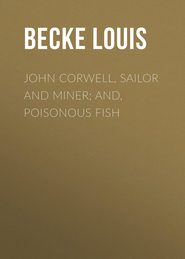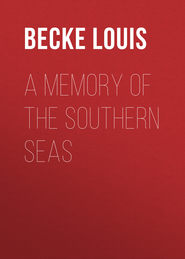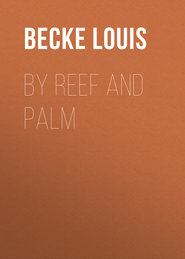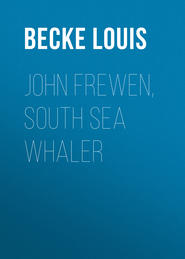По всем вопросам обращайтесь на: info@litportal.ru
(©) 2003-2024.
✖
Tessa
Настройки чтения
Размер шрифта
Высота строк
Поля
Atkins nodded. “Just so, Mr. Carr. If, as you say, we had a sail it would be different. Without one it may take us a fortnight or more to get to Ponapé.”
“Quite. Now on the other hand, Pikirami Lagoon lies less than a hundred and fifty miles dead to leeward of us. It is low, but I don’t think we shall miss it if we steer W. by S., as on the south end there is a coral mound about a hundred feet high. If we do miss it we can steer south for New Ireland; we can’t miss that if we tried to, and would get there sooner than we could reach Ponapé. Then there is another advantage in our making for Pikirami—we can run before the night squalls, and the harder they blow the better it will be for us—we’ll get there all the sooner.”
Then Harvey went on to say that at Piki-rami—which he knew well—they would meet with a friendly reception from the few natives who inhabited two islets out of the thirty which formed the atoll. Twice every year the place was visited by a small German trading schooner from Blanche Bay, in New Britain, and possibly, he thought, they might either find her there loading a cargo of copra; or, if not, they could wait for her. In the latter case he would on Tessa’s behalf charter the vessel to take them all to Ponapé, for her father’s name and credit were well known from one end of the Pacific to the other, and there would be no difficulty in making terms with the master.
Atkins agreed willingly to Harvey’s suggestions, for he well knew the great risks that would attend the attempt to reach Ponapé under such circumstances as were theirs; and the native crew, much as they wished to pursue the captain and wreak their vengeance upon him and the supercargo, readily acquiesced in Harvey’s plan of steering for Pikirami Lagoon in when he pointed out to them the difficulties and dangers that lay before them by making for Ponapé, or, indeed, any other island of the Caroline Group.
“And those men there,” said Harvey, speaking in Samoan, and pointing to the captain’s boat, which was now more than a mile distant, “cannot escape punishment for their crimes; for is not this the word of God: ‘Thou shalt do no murder’? And those two men have done murder, and God will call them to account.”
Roka, the big Manhikian native, whose brother had been killed, answered for himself and his comrades in the same tongue.
“Ay, that is true. But yet it is hard that I, whose brother’s blood is before my eyes and the smell of it in my nostrils, cannot see these men die. How can we tell, master, that men will judge them for their crimes? They are sailing away, and may reach some country far distant, and so be safe.”
Harvey partly assented. “They may escape for a time, Roka, but not for long. Rest assured of that.”
Then a tot of rum was served out to each man, and the boat’s head put W. by S. for Pikirami Lagoon, while Tessa and Maoni set to work under Atkins’s directions to sew together some odd pieces of calico and navy blue print, which Latour the steward had fortunately thrust into the sack containing the firearms. When it was completed it made a fairly sized squaresail, which could always be used during light winds.
The captain’s boat had disappeared from view, when Jessop the second steward beckoned to Harvey to come to him.
“Ask the young lady to go for’ard, mister, will you?” he said, turning his haggard eyes upon the trader’s face. “I feel as ‘ow I’m goin’, an’ I said I would make a clean breast of it. But I don’t want ‘er to ‘ear; do ye twig, mister, though I’ll tell you and Mr. Hatkins?”
Harvey nodded, and whispered to Tessa to go for’ard. “The poor little beggar is dying, Tessa, and has something to tell me.”
Tessa and Maoni went for’ard and sat down under the shade of the newly-made mainsail, which was hoisted upon an oar with a bamboo yard. There they were quite out of hearing of the vile confession of Jessop’s complicity with Chard and the captain made by the wretched man, who was now sinking fast, and knew that his hours were numbered, for, as Morrison had surmised, one of his lungs was fatally injured. And when he had finished the low-spoken tale of his villainy even the rough-natured Atkins was filled with pity when he saw how the poor wretch was suffering, both physically and mentally.
“You’ve done right, Jessop, in telling us this; it’ll be all the better for you when you have to stand before the Almighty, won’t it, Mr. Carr?”
“Yes, indeed, Jessop,” said Harvey kindly; “and I wish we could do something to alleviate your pain, poor fellow!”
“Never mind, sir. You’re a gent if ever there was one, and you ‘as taken away a lot o’ the pain I’ve ‘ad in me ‘eart by forgivin’ me. And perhaps the young lady will just let me tell ‘er I’m sorry, and give me ‘er ‘and before I go.”
Atkins beckoned to Tessa, who came quickly aft and knelt beside the dying man, who looked into her soft, sympathetic face longingly yet fearfully.
“I’m a bad lot, miss, as Mr. Carr will tell you when I’m dead. It was me that give you and Monny the drugged coffee, and I want you to forgive me, an’ give me your ‘and.”
Tessa looked wonderingly at Harvey, who bent towards her and whispered a few words. In an instant she took Jessop’s hand between both of hers.
“Poor Jessop,” she said softly, “I forgive you freely, and I do hope you will get better soon.”
He looked at her with dimmed, wistful eyes. “Thank you, miss. You’re very kind to a cove like me. Will you ‘old me ‘and a bit longer, please.”
Early in the afternoon, as the boat slipped lazily over the gentle ocean swell, he died. And though Atkins and Harvey would have liked to have acceded to his last wishes to be buried on shore, stern necessity forbade them so doing, for they knew not how long it would be ere they reached Pikirami; and so at sunset his body was consigned to the deep.
For the rest of that day, and during the night, when the white rain squalls came with a droning, angry hum from the eastward and drenched the people with a furious downpour, flattening the heaving swell with its weight, the boat kept steadily on her course; and, but for the shadow of death which hourly grew darker over poor Morrison, the voyagers would have talked and laughed and made light of their sodden and miserable surroundings. Morrison himself was the most cheerful man in the boat, and when Atkins and Harvey rigged an oilskin coat over him to keep the rain from his face at least he protested as vigorously as he could, saying that he did not mind the rain a bit, and urging them to use it to protect “the two lassies” from the blinding and deafening downpour.
Dawn at last.
The misty sea haze lifted and scattered before the first breath of the gentle breeze, a blood-red sun leapt from the shimmering water-line to windward; a frigate bird and his mate swept swiftly through the air from the westward to view the dark spot upon the ocean two thousand feet below, and day had come again.
Tessa had the engineer’s old, grey head pillowed on her lap. Harvey held his right hand, and Atkins, who knew that the end was near, had taken off his soddened cap, and bent his face low over the haft of the steer-oar.
“Do you feel any pain, Mr. Morrison?” asked Tessa, as she stroked the old man’s face, and tried to hide her tears.
“Well, I wouldna be for saying no, and I wouldna be for saying yes, my dearie,” replied the brave old fellow; “I’m no complaining aboot mysel’, but I’d like to see ye ‘saft and warm,’ as we Scots say, instead of sitting here wi’ my auld, greasy head in your lap, and your ain puir body shivering wi’ cauld. Gie me your hand, Harvey Carr… and yours too, Miss Remington.... May God guide ye both together; and you too, Atkins, for ye are a guid sailor man, and a honest one, too. And if ye can get to this lagoon in time—ye know what I mean—ye’ll pit my auld bones under God’s earth and no cast me overboard?”
Atkins was beside him in a moment. “Brace up, Morrison, old man, you’re a long way off dead yet,” he said, with rough sympathy.
“Nay, Atkins, I’m verra near… verra near. But I hae no fear. I’m no afraid of what is to come; because I hae a clean sheet o’ my life to show to the Almighty—I’m no like that puir devil Jessop. Harvey man, listen to me. Long, long ago, when I was a bairn at my mother’s knee, I read a vairse of poetry which has never come to my mind till now, when I’m verra near my Maker, I canna repeat the exact words, but I think it goes like this,” he whispered,
“‘He who, from zone to zone, Guides o’er the trackless main the sea-bird’s flight, In the long way that I must tread alone Will guide my steps aright.’”
“May God guide us all as He guides the sea-bird, and as He has guided you,” said Tessa sobbingly, as she pressed her lips to his cheek.
Morrison took her hand and held it tightly,
“God help and bless ye, lassie. May ye and Harvey never see the shadow of a sorrow in your lives. Atkins, ye’ll tak’ guid care to remember that there is a hundred and sixty-three pounds due to me frae Hillingdon and MacFreeland, and that if ye do not care to take it yoursel’, it must go to auld John Cameron, the sailors’ parson in Sydney. Ye hae ony amount of witnesses to hear what I’m now telling ye. I’m no for being long wi’ ye, and I dinna want yoursel’ nor auld Jock Cameron to be robbed.”
“I’ll see that the old parson gets it, Morrison,” said Atkins huskily; “he’ll do more good with it than a man like me.”
“Man,” said the old engineer, as he lifted his kindly grey eyes to the second mate, “ye’re welcome to it. I wish it were a thousand, for ye’re a grand sailor man, wi’ a big heart, and maybe ye hae some good woman waiting for ye; and a hunner and sixty pound is no sma’ help to–”
His voice failed, but his lips were smiling still as he gave his last sigh; and then his head lay still in Tessa’s arms.
CHAPTER IX
All that day over a gently heaving sea the boat sped steadily onward before the soft breath of the dying trade wind, and when night fell Harvey and Atkins reckoned that they could not be more than twenty miles from Pikirami. About midnight, therefore, the sail was lowered, and the boat allowed to drift, as otherwise she might have run past the island in the darkness. Two of the natives were placed on the look-out for indications of the land, and the rest of the people, except Harvey, laid down and slept, for after one or two rain squalls early in the evening the night had turned out fine and dry.
Poor Morrison’s body had been covered up and placed under the for’ard thwarts; amidships lay Atkins, who had fallen asleep with his pipe in his mouth and his head pillowed on the naked chest of one of the native sailors; aft, in the stern sheets, Tessa and Maoni slept with their arms around each other, Tessa’s pale cheek lying upon the soft, rounded bosom of the native girl. Still further aft, on the whale-back, Harvey sat, cross-legged, contentedly smoking a stumpy clay pipe lent to him by Huka, and looking, now at the glorious, myriad-starred sky above, and now at the beautiful face just beneath him, and musing upon the events of the past few days. Then as his eye rested for a moment or two on the stiffened form of the dead engineer, his face hardened, and he thought of Chard and the captain. Where were they now? Making for Ponapé, no doubt, with all possible speed, so that they might escape in some passing whale-ship or vessel bound China-wards. But where could they go? What civilised country would afford protection to such fiendish and cruel murderers? Neither of them dare dream of ever putting foot on Australian soil again if a single one of the survivors of the Motutapu reached there before them. Then he thought of Hendry’s wife and three fair daughters.
“Poor things,” he muttered, “the story of their father’s crime will break their hearts, and make life desolate to them. Better for them if the Almighty, in His mercy, took them before this frightful tale is told to wreck their lives.”
An hour passed, and then Roka, who was one of the look-outs, came aft, stepping softly so as not to awaken the sleepers.
“What is it, Roka?”
“Listen,” whispered the native, “dost hear the call of the kanapu? There be many of them about us in the air; so this land of Pikirami must be near.”
Harvey nodded and listened, and though his ear was not so quick as that of the sailor, he soon caught the low, hoarse notes of the kanapu, a large bird of the booby species, which among the islands of the North-West Pacific fishes at night-time and sleeps most of the day; its principal food being flying-fish and atulti or young bonito, which, always swimming on the surface, fall an easy prey to the keen-eyed, sharp, blue-beaked bird.
“Ay, Roka,” said the trader, “we be near the land, for the kanapu never wandereth far from the shore.”
Low as he spoke, Tessa heard him, for she slumbered but lightly. She rose and sat up, deftly winding her loosened hair about her head.
“Is it land, Harvey?”
“Land is near, Tessa. We can hear the kanapu calling to each other.”
“I am so glad, Harvey; for it would be terribly hard upon the men if we missed Pikirami and had to make for New Britain.”











